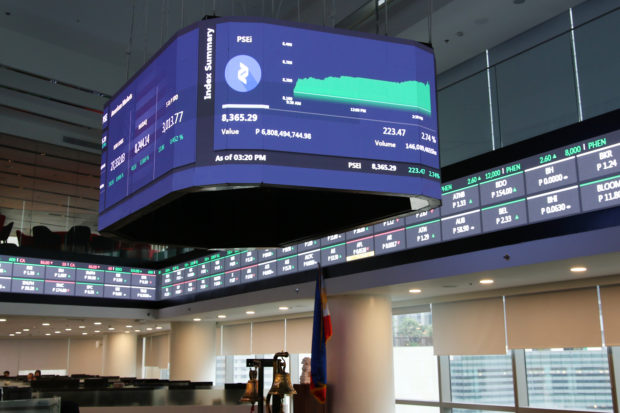
The Philippine Stock Exchange (PSE) plans to relax listing rules and offer time-bound relief for initial public offering (IPO) applications in 2021 or 2022 in consideration of the coronavirus (COVID-19) pandemic.
In a Sept.23 memorandum meant to generate feedback from stakeholders, PSE president Ramon Monzon proposed to ease listing standards in order to attract more issuers to the local bourse, which currently has the lowest number of listed companies in Southeast Asia.
For the main board, the PSE seeks to scrap the minimum market capitalization requirement of P500 million. However, listing applicants must have booked a cumulative net income of P75 million for the past three fiscal years, and a net income of at least P50 million for the fiscal year immediately preceding the filing of the application.
The PSE henceforth intends to use net income, instead of earnings before interest taxes, depreciation and amortization (EBITDA), as profitability metric, in line with Southeast Asian norms where after-tax profit is used to evaluate applicants.
For the SME board, the PSE plans to remove the current requirement of positive EBITDA in at least two of the three fiscal years before listing application. If a potential issuer is unable to meet the cumulative EBITDA requirement, it must have generated cumulative net sales or operating revenues of at least P150 million for the last three years, with at least 20 percent average net sales or operating revenues growth rate over the last two years.
The PSE also seeks to shorten the operating history requirement of new applicants from three years to two years and replace the P100 million minimum authorized capital stock requirement with P25 million paid-up capital.
The bourse will also do away with the restriction against changing the primary purpose and/or secondary purpose for a period of seven years from listing on SME board, currently a deterrent to backdoor listing.
Meanwhile, the PSE also plans to allow “sponsor-driven” listings on the SME board for companies that are unable to comply with the profitability and/or operating history requirement.
“This big brother model is adopted by various bourses in the region and we think that this will also work in our market. There are so many SMEs, even start-ups, with very promising business concepts and models that may still not qualify to list even with our proposed SME Board rule revisions. But this should not deter these companies from tapping the stock market for their funding requirements. With the Sponsor model, we hope to help and support more SMEs grow their businesses,” Monzon explained.
In the sponsor model, suitability for listing will be evaluated by a listing sponsor accredited by the PSE using the sponsor’s own deal selection criteria. After assessing financial condition, business viability, future prospects, and management’s track record, among others, the listing sponsor will be required to provide guidance, including business and compliance advisory services, to the issuer for three years after listing.
For IPO applications that will be filed in 2021 and 2022, the PSE, on a case-to-case basis, may consider the profitability of the applicant for any two fiscal years in the three most recent fiscal years, excluding the year that COVID-19 had bludgeoned the company.
For an IPO application filed in 2021 by a company hit hard in 2020, for instance, the two most recent fiscal years will be 2018 and 2019. If the application is filed in 2022 and the year of the impact is 2020, the two most recent fiscal years will be 2019 and 2021.
The listing applicant must fully disclose in the prospectus the adverse impact of the pandemic on its operations, expected duration of the business effects of the pandemic, recovery measures, and business prospects of the applicant in the next five years, among others.
“PSE shall determine the suitability of the applicant to be listed with due consideration to the adverse effect of the pandemic and the applicant’s recovery measures. In this regard, the latest interim financial statements of the applicant, when available, will be considered in the evaluation of the applicant’s prospects of recovery from the pandemic,” the PSE said.
To date, the PSE is at the bottom of the pit when it comes to listing activities in the region. There are only 271 listed companies in the PSE, compared to 932 in Bursa Malaysia, 691 in Indonesia Stock Exchange, 716 in Singapore Exchange and 724 in Stock Exchange of Thailand. Vietnam has 357 companies in the Hanoi Stock Exchange and another 380 in the Ho Chi Minh Stock Exchange.